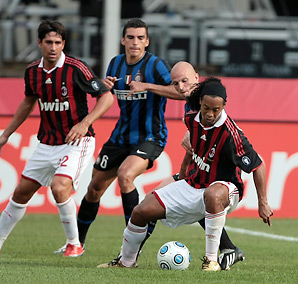
Dark days up ahead for Serie A?
That question can't help but escape fans of Serie A. It's not just the fact that the Italian league lost arguably its two biggest stars this summer -- Kaká, who went from AC Milan to Real Madrid, and Zlatan Ibrahimovic, who joined Barcelona from Inter Milan -- it's the general paucity of big transfers, particularly from abroad.
Take away Diego, who joined Juventus from Werder Bremen; Lúcio, whom Inter signed from Bayern; and Samuel Eto'o, who was actually a makeweight in the Ibrahimovic deal, and you're left with very little. There's Fabio Cannavaro returning to Italy at age 36; Marko Arnautovic, a 20-year-old prospect and nothing more, to Inter; Oguchi Onyewu on a free transfer and a few others.
But it's not just about players. It's about money. Milan, once the last word of extravagance, has put new boss Leonardo on a shoestring budget. Owner Silvio Berlusconi is peddling the idea of relaunching the Rossoneri with a string of players 23 years old or younger. If it smacks of desperate re-branding, there's a reason: Alexandre Pato, who has been the subject of endless transfer rumors, is the only likely starter younger than 23.
Inter, the defending champion, probably will end the summer with a positive transfer balance for the first time in longer than anyone cares to remember. When even the continent's most profligate spenders decide to scale back, you know times are tough.
Roma, perennially up for sale, likely will part with another of its crown jewels (possibly Alberto Aquilani, maybe Juan or Philippe Mexes), just as it seems to do every year. Heck, even skipper and resident heartbeat FrancescoTotti has taken a pay cut just to help out.
Juventus is the one exception, having spent big to secure Diego and Felipe Melo (from Fiorentina). That gives rookie coach Ciro Ferrara an instant upgrade in midfield, but you get the sense it was the kind of spending mandated by necessity. Unless the Bianconeri rolled the dice this summer and launched a serious assault on the title, it would be their longest spell without a major trophy (at least of the kind that doesn't later get stripped) since before World War II. Not that it's a bad strategy -- investing during a recession is one way to prepare for the upturn.
Elsewhere, the outlook is bleak. Fiorentina, for a while, looked as if it had the money and the plan to compete at the highest level, but when you sell your best players year after year because your owners are "a little too responsible," you probably won't compete in the short-term. Lazio seems on perpetual life-support after nearly going bankrupt, Napoli is taking baby steps (by the time it's ready to compete, Diego Maradona's grandson might be in the picture) and the rest of the teams are mostly about finding a way to make lemonade from lemons.
So is this as bad as it gets? Actually, financially, it will probably get even worse. Sooner or later, clubs will have to spend serious money to upgrade, build or buy their stadiums (without which they won't have the kind of match-day revenue enjoyed by their rivals in Germany, England and Spain), and that won't come cheap. And when the sale of collective TV rights kicks in next summer, it will deal a hammer-blow to the country's biggest clubs, at least in the short-term (long-term there is little question that it's the right way to go).
Those two will be very bitter pills to swallow. But that's really the only way the healing can begin. Serie A is paying for the excesses, mismanagement and blend of incompetence and outright thievery of the past two decades. At some point, the corner needs to be turned.
The good news is that, throughout all this, the production line of quality players and coaches actually has remained pretty good, given the circumstances. And, ultimately, a big part of the game is about the guys who actually step on to the pitch.
The bad news is that -- like the global financial downturn -- it will almost certainly get worse before it gets better.




